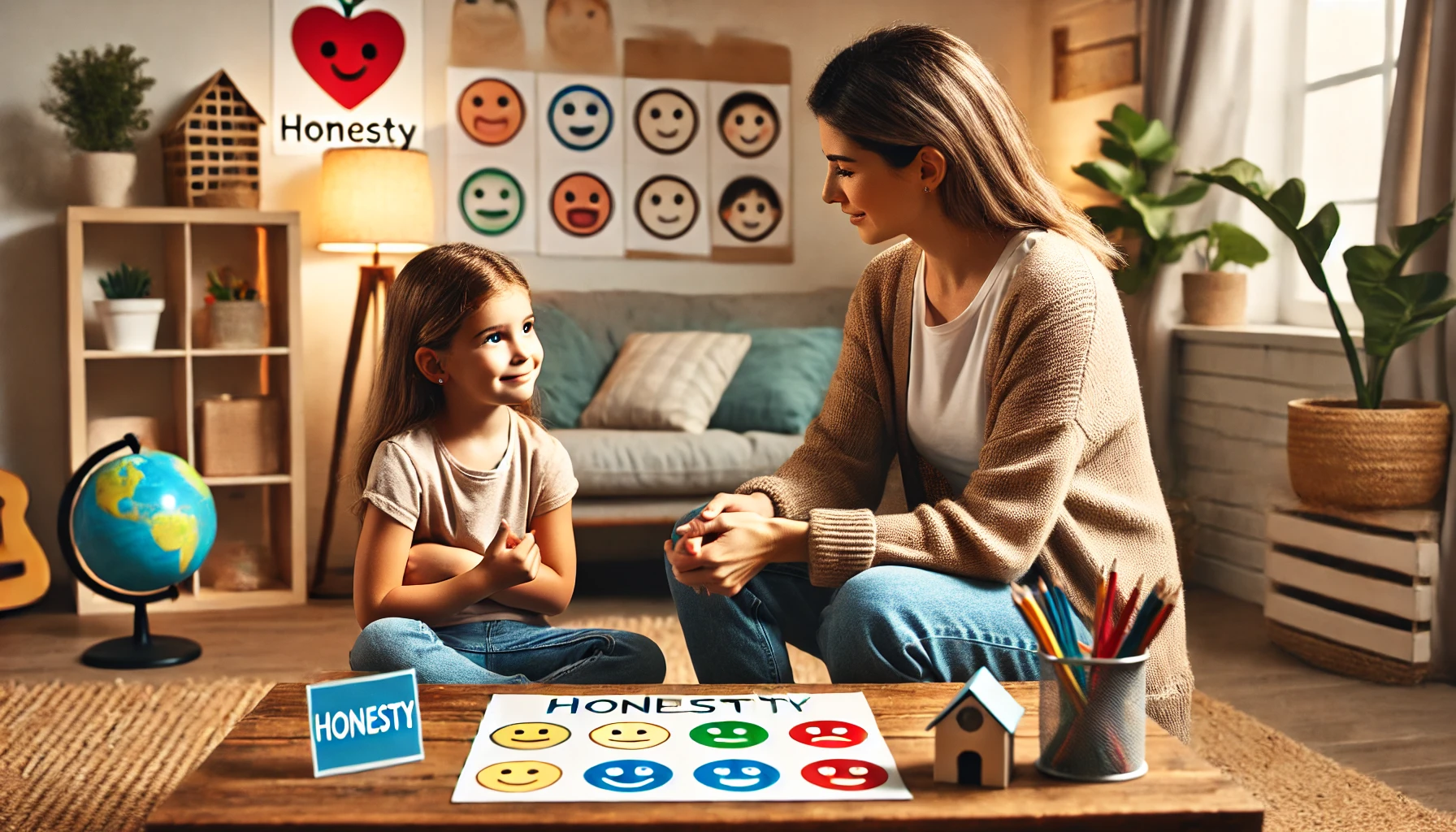How to Teach Young Children About Honesty and Telling the Truth
Honesty is a cornerstone of character development, and it’s never too early to begin teaching it. While young children may not always distinguish between truth, imagination, and wishful thinking, they can learn the value of being truthful through gentle guidance, relatable stories, and everyday conversations. Teaching honesty helps children build trust, take responsibility, and develop a strong moral compass.
Why Honesty Is a Foundational Value
- Builds trust in relationships
- Fosters responsibility and accountability
- Encourages moral reasoning and decision-making
- Helps children feel secure in telling the truth
- Promotes self-awareness and emotional growth
1. Explain What Honesty Means in Simple Terms
Use clear, relatable language.
Activity Idea:
- Say: “Being honest means telling the truth, even when it’s hard.”
- Use examples: “If you spilled the juice, being honest means saying ‘I spilled it’ instead of blaming someone else.”
- Ask: “How do you feel when someone tells the truth?”
What Kids Learn:
- That honesty is about being truthful in actions and words.
- The difference between accidental and intentional dishonesty.
- That truth builds trust.
2. Read Stories That Highlight Honesty
Books provide safe examples for learning.
Activity Idea:
- Read The Empty Pot by Demi or The Boy Who Cried Wolf.
- Discuss character choices: “What happened when the character lied?”
- Ask: “What would you have done?”
What Kids Learn:
- The consequences of lying.
- The strength it takes to tell the truth.
- Emotional connections to honesty through stories.
3. Model Honesty Yourself
Children learn most from what they see.
Activity Idea:
- Be open about mistakes: “I forgot to call Grandma. I’ll call her now and say I’m sorry.”
- Avoid “white lies” in front of your child.
- Show how you handle tough truths gently and kindly.
What Kids Learn:
- That everyone makes mistakes.
- That adults value truth.
- How to be honest without hurting others.
4. Praise Truth-Telling, Even When It’s Hard
Reinforce bravery and responsibility.
Activity Idea:
- Say: “Thank you for telling me what happened—that was very honest.”
- Focus on the truth instead of the mistake: “I’m proud you told the truth about breaking the toy.”
- Use rewards like stickers or stars to acknowledge honesty over time.
What Kids Learn:
- That telling the truth feels good.
- That they won’t be punished for honesty.
- That honesty matters more than perfection.
5. Help Kids Understand the Effects of Lies
Discuss real-life consequences gently.
Activity Idea:
- Use puppets or toys to act out a story where someone lies and causes confusion.
- Ask: “How did the other characters feel?”
- Reflect together: “What would honesty have changed?”
What Kids Learn:
- That dishonesty can hurt feelings or cause trouble.
- How others feel when lied to.
- That truth creates peace and understanding.
6. Role-Play Common Situations
Practice makes honesty easier in real life.
Activity Idea:
- Pretend you found a broken object—ask: “What do you say if you broke it?”
- Play “truth vs. lie” with scenarios and ask your child what they would do.
- Praise honest responses and gently guide others.
What Kids Learn:
- How to apply honesty in everyday moments.
- That they’re allowed to admit mistakes.
- Confidence through rehearsal.
7. Teach the Difference Between Pretending and Lying
Imagination is different from deception.
Activity Idea:
- Say: “It’s okay to pretend you’re a superhero. But if you say you cleaned your room when you didn’t, that’s not honest.”
- Encourage storytelling while also discussing real vs. pretend.
- Make space for both: “Is that a true story or a pretend one?”
What Kids Learn:
- The line between fantasy and falsehood.
- That pretending is okay when others know it’s not real.
- How to be honest and creative at the same time.
8. Create a Safe Environment for Honesty
Fear of punishment often leads to lies.
Activity Idea:
- Use calm reactions when mistakes are confessed: “Thank you for telling me. Let’s fix it together.”
- Avoid harsh scolding when the truth is told.
- Let your child know: “You can always tell me the truth. I’ll help you.”
What Kids Learn:
- That honesty is safe and supported.
- That they won’t lose love or trust for telling the truth.
- That parents are allies, not judges.
Final Thoughts
Teaching honesty to young children isn’t about forcing confessions—it’s about creating a culture of trust and openness. Through stories, modeling, and compassionate conversations, children can learn that truth-telling is brave, helpful, and always worth it. When honesty is encouraged gently and consistently, kids grow up with integrity and strength.
